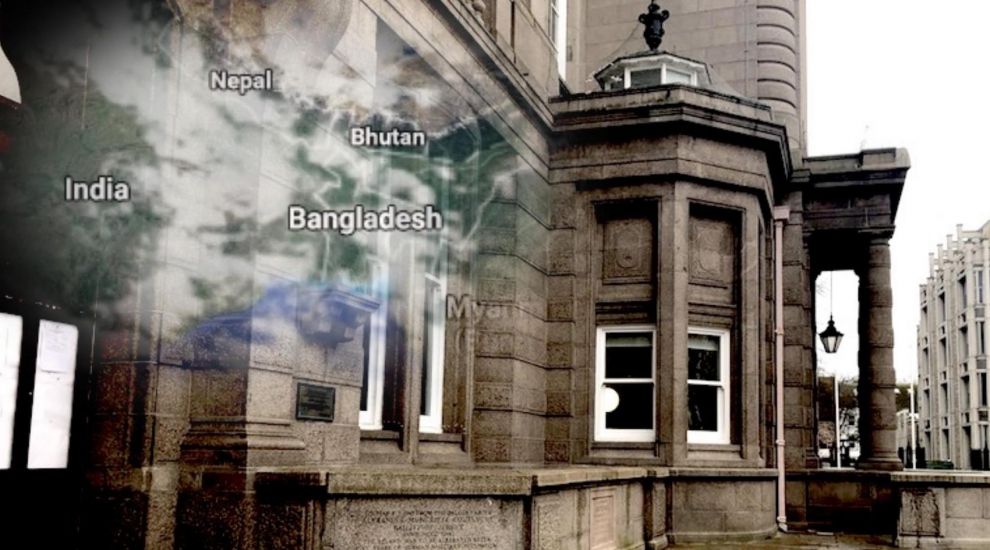

A lawyer representing the Home Affairs Minister yesterday attempted to cast doubt over the story of a Bangladeshi man, who is fighting to claim asylum in Jersey over fears he could be killed in his home country.
The man – who cannot be named to protect his identity - appeared before the Royal Court to review the refusal of his application for asylum.
He was detained after a search of a St. Helier restaurant by Customs and Immigration officials in August 2017, a week after he had illegally entered the island.
Following his arrest, he claimed asylum on the grounds that he could be harmed in his native country for his political beliefs - but this application was rejected.
A report was prepared for the then Assistant Home Affairs Minister, Senator Kristina Moore, in January 2018, which led to a refusal. She then revoked this rejection, and the man was allowed to provide further submissions. Those submissions, along with the report, were then given to the new Minister for Home Affairs, Constable Len Norman, in August 2018.
He indicated to the Customs and Immigration Service that there were "inconsistencies" in the applicant's evidence, and that certain parts of his case were not accepted. His reasons for the refusal were formalised and provided to the asylum seeker in September.

Pictured: The man left Bangladesh in 2012.
The case then reached the Royal Court in February 2019, as the Bangladeshi national sought permission for a judicial review of the decision, which the Deputy Bailiff, Tim Le Cocq, granted.
“The claim for asylum is based on the Applicant’s fear that if he is returned to Bangladesh his life and liberty will be in danger and he will otherwise face acts of persecution by agents of the state or by non-state agents acting with the aid or explicit approval of the state,” the Deputy Bailiff summarised in his judgment.
The man appeared in Court yesterday where his advocate, Richard Holden, detailed the grounds for the judicial review, which he said rested on two aspects, the delay between the decision and the reasons being given and the quality of the latter. “Was sufficient reason given?” he asked.
He reminded the Court that the man was a member of an opposition party, the Bangladesh National Party (BNP) and that his political beliefs had exposed him to persecution. He left his country as a result in 2012. He went to the UK using a student visa before travelling to Jersey in 2017.
The man said in a previous hearing that the ruling party in his country victimised those who oppose it – even suggesting that security services there were “complicit” in the persecutions, going so far as to “murder” political opponents.
He also said that he had faced problems for his beliefs, having allegedly been falsely charged by Bangladeshi authorities after attending demonstrations in 2007 and 2008.

Pictured: Constable Len Norman rejected the application for asylum in September 2018.
Advocate Holden said that an application for asylum was “a really important thing to get right.”
“The moment a decision is made the Minister must have in mind his reasons,” he added. He argued that the Minister for Home Affairs, Constable Len Norman, should have given his reasons when he announced his decision, not later on, not that “retrospective rationalisation was not allowed.”
He also argued that the consistency in all the documents provided by the man had not been considered and the conditions of life in his country had not been mentioned in the reasons, and “therefore not taken into account.”
Presenting the Home Affairs Minister’s approach to the application, Advocate Steve Meiklejohn, pointed out the number of inconsistencies that had cast doubts over the man’s application.
Those included issues with an injury certificate and its “veracity”, as well as with the consistency over how much time he had spent in the hospital. “He says he spend two to three days in hospital, but the certificate says he was discharged after one night,” Advocate Meiklejohn said.
Pictured: The Court will publish its judgment at a later date.
The Advocate also said the man had not been able to name other people arrested with him and that there had been further inconsistencies around the information surrounding his arrest.
He also told Court that the man had attended a second demonstration just a year after being arrested. “The conclusion drawn is that if he felt a year later he could take part in a demonstration, without fear or prosecution, why can he not return to Bangladesh some 10 years later?”
Advocate Meiklejohn said the inconsistencies affected the man’s credibility, which had led the Minister to reject the idea that he had “a well-founded fear of persecution.”
He concluded his address saying the decision had been taken following “careful scrutiny” and urged the Court to “dismiss all grounds.”
The Deputy Bailiff, who was sitting with Jurats Olsen and Austin-Vautier, said the Court reserved its judgment.
Comments
Comments on this story express the views of the commentator only, not Bailiwick Publishing. We are unable to guarantee the accuracy of any of those comments.